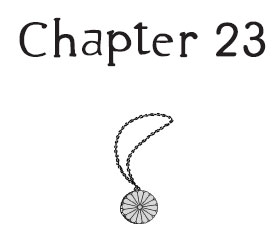
Kiko couldn’t stop thinking about the children she’d met on her way to the market. That pendant around the little girl’s neck had to be hers. The girl couldn’t know that it had been stolen and Kiko couldn’t alert anyone to the fact either. But one way or another she had to get it back.
When she’d returned from the store, Obaasan had been busy on the telephone in the kitchen. A little while later the doorbell rang and Kiko was sent to let in an old woman who had arrived in a taxi. She had grey hair and brown eyes, and carried only a small suitcase. Obaasan guided her away upstairs before Kiko could learn the woman’s name or how long she was planning to stay.
Now Kiko was doing some more washing in the basement laundry. Obaasan’s shrill voice screamed her name, so Kiko raced upstairs.
‘What is it?’ she panted.
Obaasan was standing in the kitchen leaning against the sink and clenching her fists. ‘We have another one.’
‘Another one?’ Kiko asked cautiously.
‘He told me he was planning to go soon, but I didn’t think he meant today.’
Kiko gasped. She hoped Obaasan didn’t mean the Ojiisan at the end of the hallway.
‘Who is it?’ Kiko asked.
‘The grumpy old curmudgeon who sat at the end of the table. But you know, I liked him. He made me laugh and he didn’t smell so bad either.’ Obaasan sighed. ‘He could have waited until tomorrow. One a month is enough for me and now we have two in a day.’
‘Does his family know?’ asked Kiko.
Obaasan shook her head. ‘He has no family. That’s why he came here and I looked after him so well.’
‘You are a good friend,’ the child said quietly.
‘Do you think so?’
Kiko wondered if she was going to have to pack away the man’s things and clean the room, just as she had earlier.
Obaasan looked at the clock on the wall.
‘Yoshi, go and make tea for Ojiisan in the room at the end of the hall,’ Obaasan instructed. ‘I will make some phone calls.’
The child did as she was told. She much preferred to make tea over cleaning another dead person’s room.
A few minutes later she carried the tea tray carefully upstairs and knocked at the door. She called out but there was no answer. Kiko put the tray down and slid open the door, then took the tray to the table. As usual, he was in the chair facing the window, but now his eyes were closed. Kiko’s heart thumped. She’d heard once that bad things happened in threes.
‘Ojiisan,’ she whispered. ‘Would you like me to pour your tea?’
He didn’t move. Kiko leaned in closer.
‘Ojiisan,’ she said a little louder.
He snorted and sat upright. Kiko leapt into the air.
‘What? What is it?’ he demanded.
‘Sorry, Ojiisan. I just had to check.’
‘Check what? That I was breathing?’ He peered at the girl.
Kiko didn’t reply.
‘You can let that silly old woman know that there is life in me yet.’
Kiko nodded. She picked up the teapot and began to pour exactly the same way she had done the day before.
The old man studied her. ‘Why does Obaasan think you are a boy?’
Kiko froze. ‘I am a boy,’ she whispered.
‘Then I am a teenager,’ the old man replied, raising his fuzzy eyebrows.
Kiko’s head spun and she reached out to steady herself.
‘Don’t worry. I won’t tell the old witch. You must have your reasons. We all have our reasons for being here and it is none of her worry as long as you do your work.’
Kiko exhaled. ‘How did you know?’ she asked.
‘You have slender hands. They remind me of my daughter,’ he said. ‘And you don’t pour tea like any boy I have ever seen.’
Kiko inspected her fingers. It was true – they were long. She had taught herself to play the koto and had begged her aunt for lessons, but they were not forthcoming. Hatsuko did not like music.
‘Is your daughter close by?’ Kiko asked.
The man closed his eyes and brushed away a tear. His lip trembled. ‘My daughter is gone.’
‘I’m sorry. It is none of my business,’ Kiko said, and quickly poured some more tea.
Sunlight streamed through the windows, bathing the man in light. He sipped his tea and sat in silence.
Kiko retreated and turned to walk back along the hall. For the second time that day, one of the old people was being carried downstairs, never to return.